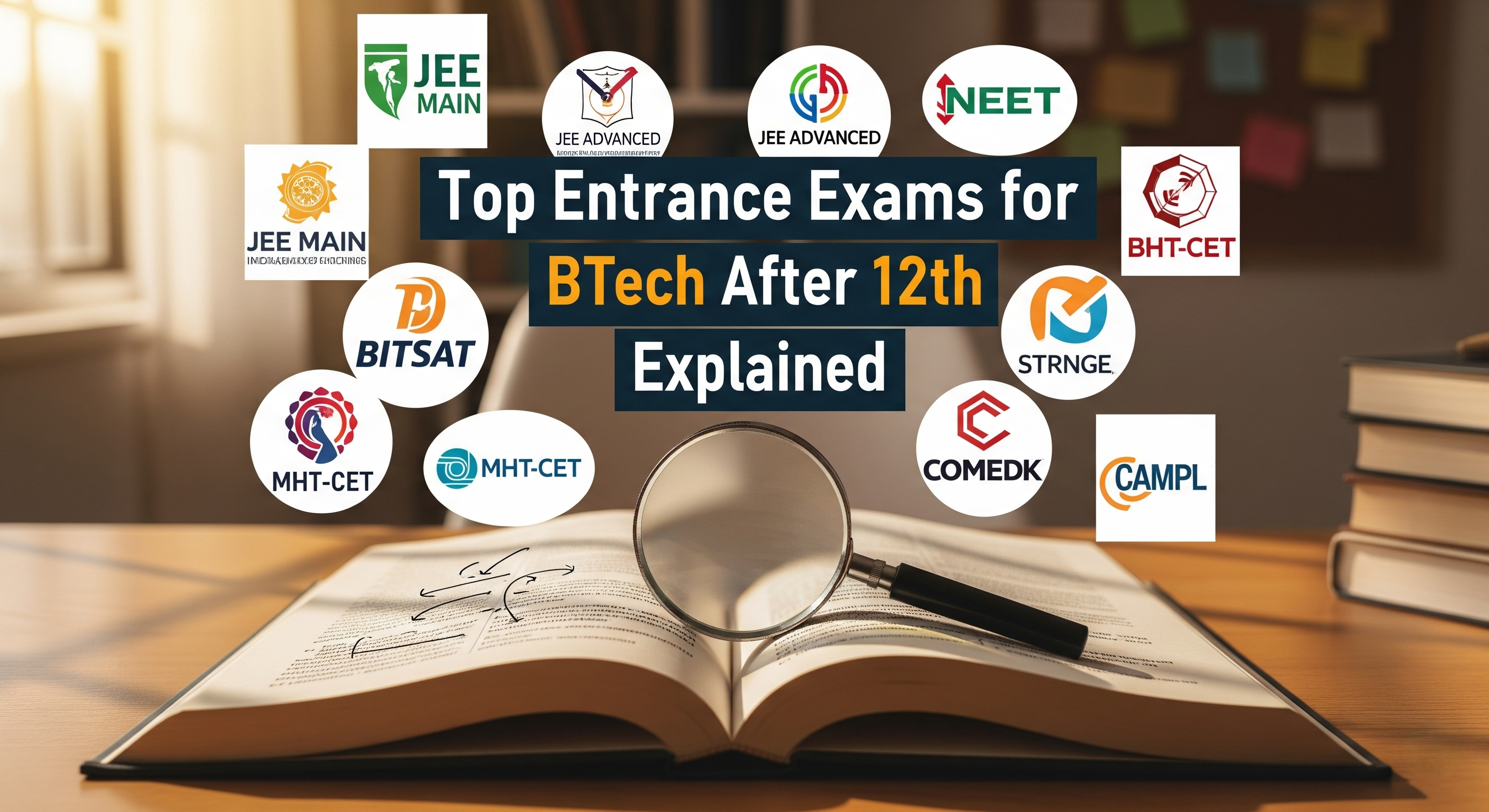
Top Entrance Exams for B.Tech After 12th *
The path to engineering starts with passing the appropriate BTech entrance exams immediately after finishing 12th grade. The exams serve as the main entry points for students who want to join top engineering institutions across India. What is an entrance exam for BTech exactly? These standardised tests evaluate your science and math knowledge base to connect your high school education with engineering studies. This guide provides complete information about BTech entrance exams after 12th to students, their families, and teachers and keeps them updated.
How Does an Entrance Exam for BTech Serve As The Gateway to Engineering Courses After 12th?
The admission process to top engineering colleges in India remains extremely competitive. An entrance exam for BTech functions as a merit-based selection process which grants admission to top institutions to qualified candidates. The majority of universities use these exam scores to shortlist the best applicants. The BTech exams you perform well in will determine which university you attend and what academic path you will follow.
The outcome of passing a reputable BTech entrance after 12th leads to excellent educational programs, strong job placement networks, and international recognition, which shapes your future career direction.
National-level B.Tech Entrance Exams
Here is the list of all the national-level BTech entrance exams that engineering aspirants after 12th can take for admission into reputed engineering institutions across the country.
Entrance Exam |
Overview |
Eligibility |
Duration |
Exam Pattern |
Role in Admission |
|---|---|---|---|---|---|
JEE Main |
It is a national-level engineering exam, which is the qualification exam to appear in JEE Advanced, a well-known engineering entrance examination. | Anyone who is in the 12th grade or has completed it with PCM as their subject in 12th can appear. | 3 hours | It is a CBT mode exam with MCQs and NAT question types. | Qualifying students get a chance to appear in JEE Advanced and get admission to NITs, IIITs, GFTIs and other reputed private engineering colleges. |
JEE Advanced |
It is the follow-up exam of JEE Main | The top 2.5 lakh students who clear the JEE Main exam qualify for this test | 3+3 hours | It consists of two papers, which are in the MCQ and Numerical Answer Type (NAT) formats. | Qualifying students get admission in IITs |
Key State-Level B.Tech Entrance Exams
Entrance Exam |
Overview |
Eligibility |
Exam Duration |
Exam Pattern |
|---|---|---|---|---|
MHT CET |
It is conducted by Maharashtra state for undergraduate admissions in Maharashtra state-affiliated colleges. | 10+2 with PCM | 3 hours | 80% of the 12th syllabus and 20% of the 11th syllabus. It is conducted in CBT mode. |
KCET |
It is conducted by the state for undergraduate admissions in engineering colleges in Karnataka. | 10+2 with PCM. Additionally, candidates outside Karnataka may have to appear for the Kannada language test (candidates from outside Karnataka who claim Kannada medium study benefits). | 4 hours | The exam consists of three subjects, each having 60 MCQs, and each subject paper is 80 minutes. |
WBJEE |
It is conducted by the state for undergraduate admissions in engineering colleges in West Bengal. | 10+2 with PCM | 2+2= 4 hours | It consists of two papers. The first paper is mathematics, and the second paper is physics & chemistry. It is a offline pen-and-paper based exam. |
University/Institute-Specific B.Tech Entrance Tests
- JUEE: Conducted by Jagannath University for admission into its various undergraduate engineering programs across its campuses.
- COMEDK UGET: COMEDK covers more than 190 private engineering colleges in Karnataka. It is a CBT-based exam open to all Indian citizens who have 10+2 with PCM.
- MET (Manipal Entrance Test): For BTech programs of Manipal Academy of Higher Education. Computer test based on PCM subjects.
- AEEE (Amrita Entrance Examination): It is conducted by Amrita Vishwa Vidyapeetham for admission to undergraduate programmes.
- Other Notable Exams: LPU NEST, KIITEE, etc., for certain institutional admission pathways.
General Eligibility Requirements for B.Tech Exams After 12th
- Academic Qualification: The candidate should have passed/be appearing for 10+2 with PCM subjects compulsorily. The minimum percentage should be 50–60%, depending on the test and category.
- Age Limit: Most of the tests have an age limit of 17 years and above at admission. In this, there is no upper age limit to appear in the exam.
- Nationality: Indian citizens, NRIs, and foreigners in some institutes are permitted to apply.
Effective Preparation Techniques for B.Tech Exams
- Early Planning: Start the preparation as early as possible, which will give you sufficient time for preparation.
- Reading the Syllabus: Have a detailed study of the syllabus to plan your schedule.
- Study Material: Use standard textbooks like NCERTs.
- Time Management: As it is a long-term goal of 2 years, create a long-term study plan and break down larger goals into daily, small goals.
- Practice & Mock Tests: Give mock tests after every topic, and solving previous year papers is a must to know the pattern and assess performance.
- Revision: Plan a schedule for the revision so you have clear concepts.
- Stress Management: Get involved in extracurricular activities, stay connected, and share your problems with your friends or seniors.
Key Dates and Application Process
- Staying Updated: Keep an eye on government examination portals, study portals, and notice portals, which are best utilised for tracking dates.
- Online Application: Applications are usually completed online. Fill correctly, ensure documents are scanned, and payment options are easily accessible.
- Admit Card & Results: Download from official websites on the dates announced.
- Counselling: Conducted at the university level or higher, typically online, based on document verification, option filling, and seat allotment.
Conclusion
If you are planning to have a successful engineering career, it begins with a BTech entrance exam after 12th. By knowing all the entrance exams and their importance, which exam will take you to which college, and what will be the future after doing engineering from that college? You will have a definite answer to such queries. After reading this article, you will understand what all entrance exams are and what you should choose to secure your bright engineering future.
FAQs
If you do not qualify for any of the major entrance exams, you have several alternatives:
- Some private colleges offer direct admission based on 12th-grade board exam marks (often through management quotas).
- You can choose to take a drop year to prepare and attempt the exams again next year.
- Consider related courses or diploma programs as alternate pathways into engineering disciplines.


